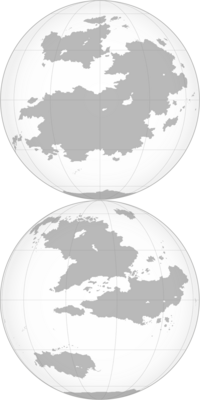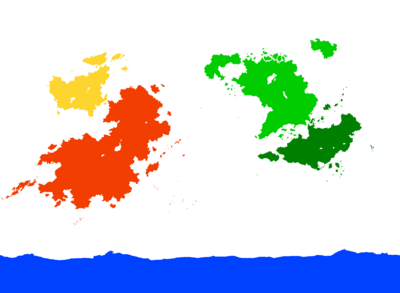Kylaris: Difference between revisions
m (→Etymology) |
m (→Continents) |
||
| Line 44: | Line 44: | ||
===Continents=== | ===Continents=== | ||
The surface of the planet is the most complex and well-studied part of it, in particular the sections not covered by the oceans. One widely accepted way of spatially organising the planet is by dividing it into continents, which are the largest sections of land, and oceans, which are the largest sections of water. | The surface of the planet is the most complex and well-studied part of it, in particular the sections not covered by the oceans. One widely accepted way of spatially organising the planet is by dividing it into continents, which are the largest sections of land, and oceans, which are the largest sections of water. | ||
[[File:Kylaris Continents Map.png|400px| | [[File:Kylaris Continents Map.png|400px|left]] | ||
{| class="wikitable sortable" | {| class="wikitable sortable" | ||
Revision as of 15:31, 12 January 2020
 | |
| Orbital characteristics | |
|---|---|
| Eccentricity | ~0 |
| Physical characteristics | |
| 243 million km2 | |
| Atmosphere | |
Kylaris, commonly known as earth, is a rocky planet in the Solaris star system. It completes an orbit around Solaris approximately every 365.2422 calendar days (rotations about its axis); from the perspective of the North Pole on the planet, like most other celestial bodies in the star system, it orbits counterclockwise. It is spherical with a slight bulge at the equator owing to its rotation, which is slightly tilted compared to its orbital axis with respect to the sun, and it has one planetoid moon. It's axis of rotation produced seasons, as it is titled in respect to the planet's orbital plane. The planet is notable for being the only known location to harbor, at any time, life.
The planet is believed to have formed conventionally, several billion years ago, from the heavier elements in the accretion disk of the sun; the presence of these elements mean that Solaris is at youngest a second-generation star. Distinct layers formed over time, as accretion slowed and the planet cooled.
The planet has a metallic core, which creates a magnetic field around the planet. This is surrounded by a mostly liquid mantle, composed of various metallic and nonmetallic elements, silicon being the most common. The outermost layer is the solid crust, or lithosphere, which is thin but encompasses the entire planet, being composed of similar but generally lighter materials than the mantle. Most of the planet's surface area is covered in liquid water oceans, with the dry parts constituting land. The atmosphere is primarily nitrogen, with a significant fraction of oxygen; most other components of the atmosphere are trace, including argon and carbon dioxide. The atmosphere can be divided into layers depending on altitude, and is thick enough to burn up the vast majority of objects which fall into it. The active tectonics and energetic atmosphere of the planet are notable, and highly influential on its topography, biosphere, etc.
All known life is native to the planet, with rough estimates of millions of species and octillions of individual lifeforms. It is thought to have been present for around half of the planet's existence. The biosphere is believed to be constrained to the crust, the lower atmosphere, and possibly the upper mantle. The only known species to have exited the atmospheric strata are humans, who are generally considered the dominant species.
Human influence stretches across the overwhelming majority of the planet's surface, though most significantly on land, and their activities have a significant impact on both the biotic and abiotic world, whether with reference to atmospheric composition, land cover, hydrology, light or the transportation and transformation of terrestrial material. Most of this is a development of the last three millennia, though humans have been around for millions of years. Human societies are highly complex and organised, with the development of dozens of nation-states of varying size, often considered to be the basic social unit of organisation (some of the most significant include Gaullica, Xiaodong and Senria. There are also many multinational organisations, some of which are limited to subsets of nation-states, forming blocs; these include the Euclean Community, Rongzhuo Strategic Protocol Organisation, Asterian Development Council and COMSED, while others are globalised, such as the Community of Nations. Significant human developments include language, of which there are thousands, organised conflict or war (such as the Great War), and techniques for manipulating other species, physical energy and matter, including electrical theory, mining, agriculture and construction. These technologies have produced the dominance of the human species in recent history and improvements in the human condition: metrics by which this can be seen include the human population doubling several times, total energy consumption multiply by even more times, the extension of lifespan, and utilisation of a greater fraction of the planet's natural resource stocks on both a per capita and absolute basis.
Etymology
The commonly accepted Estmerish name for the planet, Kylaris, is developed from a Piraean loanword, Kylari. Kylari was the name of the Piraean goddess of nature, who was also adopted into the Solarian pantheon where she was also known as Terra, resulting in the use of terra as a name for the planet in Solarian and its derivative languages.
The planet is commonly referred to as earth, another modern Estmerish word, in media and conversation. The word is derived from the Old Swathish eorðe. Like Kylaris and Terra, Earth was the goddess of the human world in Weranic paganism.
Geography
Continents
The surface of the planet is the most complex and well-studied part of it, in particular the sections not covered by the oceans. One widely accepted way of spatially organising the planet is by dividing it into continents, which are the largest sections of land, and oceans, which are the largest sections of water.
| Name | Largest country | Total population | Largest city | |
|---|---|---|---|---|
| Asteria Inferior | 196,281,051 | |||
| Asteria Superior | 324,611,244 | |||
| Euclea | 857,733,509 | |||
| Glacia | ||||
| Coius | 1,306,967,746 | |||
| Sublustria | 55,801,345 | |||
Countries
Countries are the basic organisational unit of the human species which resides on and is predominant on the planet. Their distribution has a strong relationship to the planet's geological and biospheric characteristics, and geography more generally.
| Name | Capital | Population | Continent | Head of State | Government type |
|---|---|---|---|---|---|
| 6,708,921 | Euclea | Kabentim Teguzboded | Parliamentary republic | ||
| 166,112,000 | Coius | Vimala Balchandra | Semi-presidential republic | ||
| 53,190,000 | Coius | Fath-Ali Shah | Parliamentary constitutional monarchy | ||
| 35,852,332 | Euclea | Presidency of Amathia | Semi-presidential republic | ||
| 10,029,100 | Euclea | Maarija Ryginsdohter | Parliamentary republic | ||
| 80,348,293 | Coius | Lee Seo-yeon | Parliamentary constitutional monarchy | ||
| File:Flag of Bruamah.png Brumah | File:Flag of Bruamah.png Mandalay | 16,630,542 | Coius | Lee Hsien Thant | Parliamentary republic |
| 6,825,000 | Euclea | Freodhoric Ācden | Parliamentary republic | ||
| 9,257,180 | Euclea | Kenneth IV | Parliamentary constitutional monarchy | ||
| 39,689,032 | Asteria Superior | Jean Tremblay | Parliamentary republic | ||
| 27,522,309 | Coius | Ari Maltıqa | Presidential republic | ||
| 73,491,200 | Asteria Superior | Vasilissa Masalina-Mravinskaya | Parliamentary republic | ||
| 129,899,450 | Coius | Bott "the Placeholder" Borrison | Parliamentary republic | ||
| 20,238,000 | Coius | Tawadros Makarios | Presidential republic | ||
| File:Eldmark.png Eldmark | File:Eldmark.png Hammarvik | 20,002,351 | Asteria Superior | Thyri I | Parliamentary constitutional monarchy |
| File:Estmere.png Estmere | File:Estmere.png Ashcombe | 56,519,373 | Euclea | Alice Roberts | Parliamentary republic |
| 65,596,083 | Euclea | Francesco Carcaterra | Parliamentary republic | ||
| Template:Country data Florena Florena | Template:Country data Florena Demora | 54,821,712 | Euclea | Rosa Escudero | Semi-presidential republic |
| 8,635,881 | Coius (Bahia) | Muzukuru Chiyangwa | Presidential republic | ||
| 87,176,289 | Euclea | Jean Vallette | Semi-presidential republic | ||
| 11,329,605 | Euclea | Ajdin Burić | Parliamentary republic | ||
| 64,315,036 | Coius | Yohannes Emanuel | Parliamentary republic | ||
| 17,125,503 | Euclea | Adriaan Wilhelm Paulus | Parliamentary republic | ||
| 750,000 | Sublustria | Malama Kai La'au Yokatala | Tribal confederacy | ||
| File:ImaguaFlag.png Imagua and the Assimas | File:ImaguaFlag.png Cuanstad | 1,306,505 | Asteria Superior | Edmondo Privitera | Parliamentary republic |
| 1,424,500 | Euclea | William II | Parliamentary constitutional monarchy | ||
| None | 14,387,120 | Coius | The Quintarchy | Federal constitutional quintarchy | |
| 1,403,956 | Coius | Shayban V | Parliamentary constitutional monarchy | ||
| 47,982,681 | Coius | Mahmadou Jolleh-Bande | Constitutional monarchy | ||
| 55,455,700 | Asteria Superior | Lorenzo Occhetto | Semi-presidential republic | ||
| 5,402,981 | Sublustria | Alain A. D'Isisgny | Federal tribal republic | ||
| 1,801,328 | Euclea | Colegio | Directorial republic | ||
| 88,081,653 | Euclea | Samuel Czenko | Presidential republic | ||
| 48,177,598 | Asteria Inferior | Walter Kronje | Parliamentary republic | ||
| 77,895,231 | Asteria Superior | Zacarías Figueroa | Semi-presidential republic | ||
| 27,000,000 | Euclea | Johan Olsson | Parliamentary republic | ||
| 62,468,424 | Coius | Avani Adhikari | Absolute monarchy | ||
| 13,284,889 | Euclea | Pavlos Kassapidis | Parliamentary republic | ||
| File:RwizikuruFlag.PNG Rwizikuru | File:RwizikuruFlag.PNG Guta raMambo | 18,903,392 | Coius | Kupakwashe Ngonidzashe | Absolute monarchy |
| 10,342,850 | Asteria Inferior | Arnaud Noirenègre | Presidential republic | ||
| 124,800,000 | Asteria Inferior | Théodore I | Parliamentary constitutional monarchy | ||
| 258,751,620 | Coius | Reika Okura | Parliamentary republic | ||
| 91,034,632 | Coius | Jagannath Sarkar | Presidential republic | ||
| 52,853,207 | Euclea | Presidium of the General Congress | Directorial republic | ||
| 842 | Euclea | Pope Joseph | Absolute monarchy | ||
| 112,261,345 | Coius | Kya II | Parliamentary constitutional monarchy | ||
| 43,426,894 | Coius | Atwan al-Tughluq | Parliamentary republic | ||
| 55,051,345 | Sublustria | Helene Pauline | Semi-presidential republic | ||
| 7,538,726 | Euclea | Georg-Frederik IV | Parliamentary constitutional monarchy | ||
| 10,578,243 | Euclea | Erekle Botkoveli | Parliamentary republic | ||
| 17,013,556 | Euclea | Anssi Keskitalo | Parliamentary republic | ||
| 20,184,964 | Asteria Inferior | Vytautas Kaparauskas | Parliamentary republic | ||
| 16,500,000 | Asteria Inferior | Willem Koek | Semi-presidential republic | ||
| 58,579,684 | Euclea | Charlotte | Parliamentary constitutional monarchy | ||
| 553,746,000 | Coius | Yuan Xiannian | Authoritarian republic | ||
| 62,558,975 | Euclea | Polina Volkova | Semi-presidential republic | ||
| 82,314,226 | Coius | Tĕxiú Bŭn-On | Parliamentary constitutional monarchy | ||
| 173,112,587 | Coius | Evren Volkan | Parliamentary republic |
